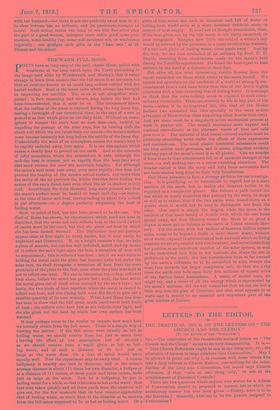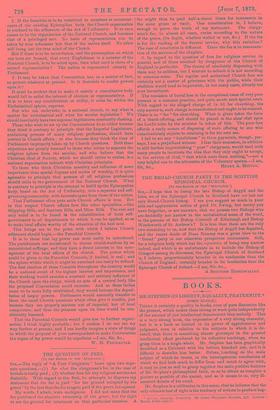LETTERS TO THE EDITOR.
THE PRACTICAL ISSUE OF THE LETTERS ON "THE CHURCH AND THE CLERGY."
[TO TR& EDITOR OF TR SPROTATOR."]
Six,—The conclusion of the remarkable series of letters on "The Church and the Clergy " seems to me very disappointing. It is,— "That Church Reformers ought to aim at one thing only, viz., the admission of laymen in large numbers into Convocation." May I be allowed to point out why I, in common with some others who take a deep interest in Church Reform, care nothing for the intro- duction of the laity into Convocation, but would urge Church reformers, if they aim at one thing only," to aim at the establishment of Parochial Councils?
There are two questions which anyone who wishes for a reform of Convocation should be prepared to answer, but to which no satisfactory answer has ever been given :—Firstly, what is to be the franchise ? Secondly, what are to be the powers assigned to Convocation ?
1. If the franchise is to be restricted to members or communi- cants of the existing Episcoplian body, the Church organisation is confined to the adherents of the Act of Uniformity. It at once ceases to be the organisation of the National Church, and becomes that of a privileged sect. No basis of representation can be taken by true reformers but that of the nation itself. No other will bring out the true mind of the Church.
But if there is to be no exclusion, and the presumption on which our laws are framed, that every Englishman is a member of the National Church, is to be acted upon, then what need is there of a second representation ? The nation is represented already in Parliament.
2. It may be taken that Convocation has, as a matter of fact, no powers whatever at present. Is it desirable to confer powers upon it?
It must be evident that to make it merely a consultative body would fail to enlist the interest of electors or representatives. If it is to have any consideration or utility, it must be, within the Ecclesiastical sphere, supreme.
But who can undertake, in a national church, to say what is matter for ecclesiastical and what for secular legislation ? We should inevitably have two supreme legislatures constantly clashing.
Those who wish to set up the Convocations do so either because they think it contrary to principle that the Imperial Legislature, containing persons of many religious professions, should have control in Church affairs ; or else because they think the time of Parliament improperly taken up by Church questions. Both these objections are greatly lessened to those who refuse to separate the religions sphere from the secular, and who believe that the Christian ideal of Society, which we should strive to realise, is a national organisation instinct with Christian principles.
To those who think Christian morality and influence of more importance than special dogmas and modes of worship, it is quite agreeable to principle that persons of all religious professions should unite in the government of the National Church. What is contrary to principle is the attempt to build up the Episcopalian body, based on the Act of Uniformity, into a separate and self- governing community, with interests apart from those of the nation.
That Parliament often puts aside Church affairs is true. Bat in this respect Church affairs fare like other specialties,—like Shipping Bills, and Sanitary Bills, and Mine Bills. The real and only relief is to be found in the rehabilitation of local self- government in all departments to which it can be applied, so as to make local affairs worthy of the attention of the best men.
This brings me to the point with which I believe Church reformers should begin,—the Parochial Councils.
It is in these that lay power can most easily be introduced. The parishioners are accustomed to choose churchwardens by an unrestricted suffrage, and they have a direct interest in the man- agement of the local affairs of the church. The power which could be given to the Parochial Councils, if limited, is real ; and the sphere within which it might be exercised can easily be defined. The first election of these Councils throughout the country would be a national event of the highest interest and importance, and their working would exercise a constant and salutary influence of the Church upon the clergy, which no acts of a central body like the proposed Convocation could exercise. And as these bodies came to be more fully established, they would become the deposi- taries of larger powers. Parliament would naturally transfer to them the small Church questions which often give it trouble, just because they are properly matters not of imperial, but of local competence, and thus the pressure upon its time would be con- siderably lessened.
That the Parochial Councils would give rise to further organi- sation, I think highly probable ; but I confess I do not see my way further at present, and I can hardly imagine a state of things in which the proposal of your correspondent to make Convocation the organ of lay power would be expedient.—I am, Sir, &c., W. H. FREMANTLE.



































 Previous page
Previous page